AI Labor Disputes in Hollywood: The Impact of Artificial Intelligence on the Entertainment Industry

AI in Hollywood: Threat or Opportunity?
Artificial intelligence (AI) has made its way into Hollywood, and it's causing quite a stir. From actors to writers, the introduction of AI technology has sparked labor disputes within the industry. As the chief editor of Mindburst.ai, I'm here to break down the concerns surrounding AI in Hollywood and explore whether it's a threat or an opportunity for the entertainment industry.
1. Job Security: Will AI Replace Human Creativity?
One of the main concerns surrounding AI in Hollywood is the fear that it will replace human creativity. Actors and writers worry that AI algorithms will be able to generate scripts and performances that are indistinguishable from those created by humans. But is this fear justified?
While AI has certainly shown impressive capabilities in generating content, it still has a long way to go before it can replicate the nuanced emotions and creativity that humans bring to the table. AI algorithms may be able to generate scripts, but they lack the ability to truly understand human experiences and emotions. So, for now, it's safe to say that AI is more of a tool for enhancing human creativity rather than replacing it entirely.
2. Fair Compensation: Who Owns the AI-generated Content?
Another major concern is the issue of fair compensation. When AI algorithms are used to create content, who owns the rights to that content? Is it the AI itself or the human creators who programmed it? This question has sparked heated debates and led to contract breakdowns within the industry.
Currently, the legal framework surrounding AI-generated content is still being developed. However, it's crucial that the rights and compensation of human creators are protected. After all, it's the human touch that brings depth and authenticity to the entertainment industry. It's essential to ensure that AI is used as a tool to enhance human creativity and not as a means to exploit it.
3. Diversity and Inclusion: Is AI Programmed to Reflect Our Society?
Diversity and inclusion have been ongoing discussions in Hollywood, and the introduction of AI has raised new concerns in this area. AI algorithms are only as good as the data they are trained on, and if that data is biased or lacks diversity, the AI-generated content will reflect those biases.
It's crucial that the entertainment industry takes steps to ensure that AI algorithms are programmed to reflect the diversity of our society. This means training AI on diverse datasets and actively monitoring and addressing any biases that may arise. By doing so, we can ensure that AI is used as a tool to promote inclusivity and representation in Hollywood.
4. Collaboration: Humans and AI Working Together
Rather than viewing AI as a threat, Hollywood should embrace it as an opportunity for collaboration. AI algorithms can be used to streamline production processes, analyze audience preferences, and even generate ideas for new projects. By working hand in hand with AI, human creators can leverage its capabilities to enhance their own creativity and deliver richer, more engaging content to audiences.
The Future of AI in Hollywood
While AI has certainly brought about its fair share of labor disputes in Hollywood, it's important to view it as a tool that can enhance human creativity rather than replace it. By addressing concerns surrounding job security, fair compensation, diversity and inclusion, and promoting collaboration between humans and AI, the entertainment industry can navigate the challenges posed by AI and harness its potential to create groundbreaking content.
So, is AI in Hollywood a threat or an opportunity? It's both. It's up to the industry to ensure that AI is used responsibly and that the rights and creativity of human creators are protected. With the right approach, AI has the potential to revolutionize the entertainment industry and bring us stories that we've never imagined before.